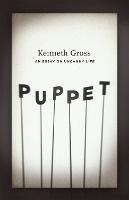


|
|
| book details |
Puppet: An Essay on Uncanny Life
By (author) Kenneth Gross

|
This book is currently unavailable. Enquire to check if we can source a used copy
|
| book description |
The puppet can entertain or terrify, evoke the innocence of childhood, or become a magical entity, able to negotiate with ghosts and gods. Puppets are often creepy things, inanimate while also full of spirit, alive with gesture and voice. In this haunting and beautiful book, Kenneth Gross takes us on a meditative journey through the world of puppet theater, exploring the mysterious fascination of these unsettling objects. Engaging particular aspects of the puppet, from its blunt grotesquerie to its talent for metamorphosis, Gross teases out their meanings, showing us the puppet in the guise of angel, seducer, demon, and destroyer. On a global tour of puppets onstage, he takes us to the raucous Punch and Judy show, the sacred shadow theater of Bali, and experimental theaters in the United States and Europe where puppets enact everything from Shakespearean tragedy to surrealist fables of discovery and loss. At the same time, he explores the puppet in poetry and fiction-including Collodi's cruel, wooden Pinocchio; puppetlike characters in Dickens and Kafka; Rilke's innocent puppet-angels; and the dark puppeteering of Philip Roth's Micky Sabbath - as well as in the work of artists such as Joseph Cornell and Paul Klee. A lovely, expressive book about re-seeing what we know, or what we think we know, ""Puppet"" evokes the startling power of puppets as mirrors of the uncanny in art and life.
| product details |
Normally shipped |
Publisher | The University of Chicago Press
Published date | 15 Oct 2011
Language |
Format | Hardback
Pages | 224
Dimensions | 22 x 15 x 2mm (L x W x H)
Weight | 397g
ISBN | 978-0-2263-0958-3
Readership Age |
BISAC | performing arts / puppets & puppetry
| other options |
|
|
|
To view the items in your trolley please sign in.
| sign in |
|
|
|
| specials |
|
|
Let's stare the future down and, instead of fearing AI, become solutionists.
|
|
This first comprehensive biography of Cecil Rhodes in a generation illuminates Rhodes’s vision for the expansion of imperialism in southern Africa, connecting politics and industry to internal development, and examines how this fueled a lasting, white-dominated colonial society.
|
|
|
|